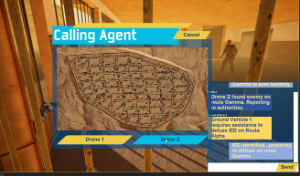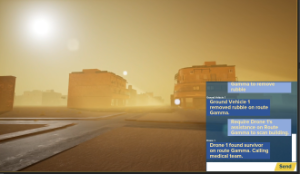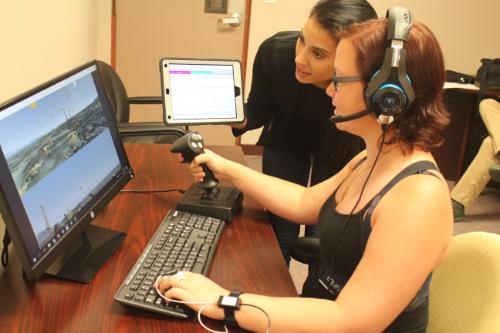Advancing Aeronautics Knowledge
The College of Aeronautics advances knowledge and provides unique, transformative learning experiences for students through solution-oriented research and key collaborative partnerships.
Human Factors Considerations for Advanced Air Mobility

The evolving Advanced Air Mobility (AAM)/Urban Air Mobility (UAM) industry involves novel, highly automated, electric Vertical Take-Off and Landing (eVTOL) aircraft, many of which will transition from being manned to completely autonomous.
Managing electrical power is different than managing fuel during flight and consideration must be given to what battery information will be presented to pilots and how this battery information will be presented to effectively support pilot decision making.
The College of Aeronautic’s ATLAS Lab is conducting research to examine the effectiveness of various electric battery information display methods. This research includes an interview study in which pilots and engineers who have flown and worked on electric aircraft were interviewed regarding the battery display information requirements and an experimental study in which various display designs will be empirically evaluated regarding their impact on pilot situation awareness and decision making related to battery information.
Image Source: https://www.nasa.gov/feature/ames/nasa-and-uber-test-system-for-future-urban-air-transport
Electric Aircraft Battery Performance
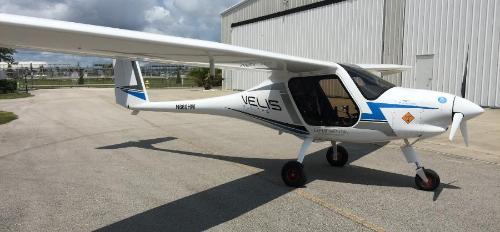 With the emergence of electric-battery-powered aircraft, it is critical to understand the performance differences between these aircraft and traditional combustion-engine-powered aircraft to ensure that pilots maintain safe flight.
With the emergence of electric-battery-powered aircraft, it is critical to understand the performance differences between these aircraft and traditional combustion-engine-powered aircraft to ensure that pilots maintain safe flight.
Under a grant funded by the FAA, COA, in collaboration with Florida Tech’s College of Engineering and Science studied aircraft performance, such as max power available, to examine the impact of state of charge and battery health.
Human Autonomy Teaming
With the growing application of Artificial Intelligence (AI) and Autonomous Agents in defense, aviation and beyond, there is a need to understand how humans can effectively collaborate with this technology.
Under a grant funded by the Air Force Office of Scientific Research (AFOSR), COA’s ATLAS Lab is studying human interaction in multi-agent teams, such as how trust and distrust in an agent propagates through a team when an agent performs an action that violates humans' trust, and how to effectively repair this trust to facilitate effective human agent team (HATs).
This effort includes collaboration with the Air Force Research Lab’s (AFRL) Gaming Research Integration for Learning Laboratory (GRILL) who support simulation testbed development.
Physiological Sensor Technology
College of Aeronautics faculty and students are utilizing advanced physiological sensor technology to assess unobservable aspects of human performance such as workload, stress, and engagement.
These measures provide insight into cognitive processes, providing an extra layer of diagnosticity in our human performance research.
Speech Recognition Interface for Submitting Pilot Reports (PIREPs)
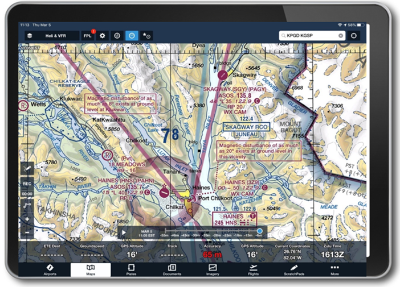
The COA research team that is funded through the FAA PEGASAS Center of Excellence and conducts work at the COA Human Factors (HF) ASSIST lab conducted a study that evaluated opportunities for “speech recognition” or “hands-minimized” Pilot Report (PIREP) generation support.
This research included development of a lexicon of PIREP-specific terminology, experimental evaluation of a speech recognition PIREP submittal tool with GA pilots and actual PIREP lexicons, and development and assessment of a prototype PIREP submission tool for pilots that mitigates PIREP submission errors.
Unmanned Aircraft Systems
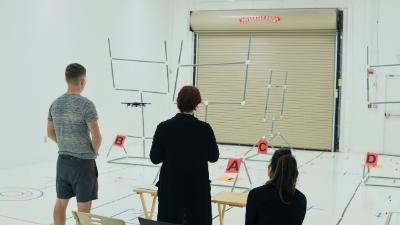
Florida Tech's College of Aeronautics was funded by the Air Force Research Lab to identify and empirically evaluate measures and interventions to increase learner engagement during UAS training. This research has developed and empirically evaluated an applied model of learner engagement. The research effort also identified physiological measures to quantify learner engagement and interventions to increase engagement during training.
Weather Representativeness & Uncertainty for Low Altitude Operations
The College of Aeronautics research team that is funded through the FAA PEGASAS Center of Excellence is conducting research focused on weather information representativeness and uncertainty in challenging and dynamic low altitude weather conditions.
The research effort is assessing and recommending tools to improve pilot understanding of information representativeness and uncertainty associated with local terrain, low altitude air dynamics, or other considerations not well captured by weather stations at Automated Surface Observing Systems (ASOS) and Automated Weather Observing System (AWOS) sites.
Additionally, this work includes utilizing machine learning to extract cloud types and/or obscurations from weather camera images and leverage these observations as both advisory information as well as information to help assess representativeness of weather conditions where surface weather systems may not be available.
Research Collaboration with Industry & Commercial Partners
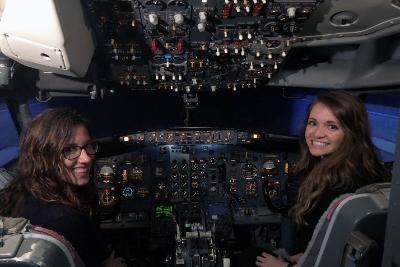
College of Aeronautics faculty and a graduate students teamed with a major US air carrier to perform a usability analysis of an EFB application currently used by the air carrier.
The Florida Tech team provided redesign recommendations to the air carrier’s EFB team that were aimed to increase usability of the EFB and streamline pilot performance.
If implemented, the redesign recommendations are predicted to decrease time to complete one of the key preflight preparation tasks by almost 50%.
-300x200.jpg)
College of Aeronautics ATLAS Lab has a collaborative partnership with the United States Air Force's Gaming Research Integration for Learning Laboratory (GRILL).
Through this partnership students have worked hand in hand with software developers to design and develop a range of different virtual environment testbeds for research and training. The partnership also facilitates internships and fellowship opportunities.

 Give to Florida Tech
Give to Florida Tech 
